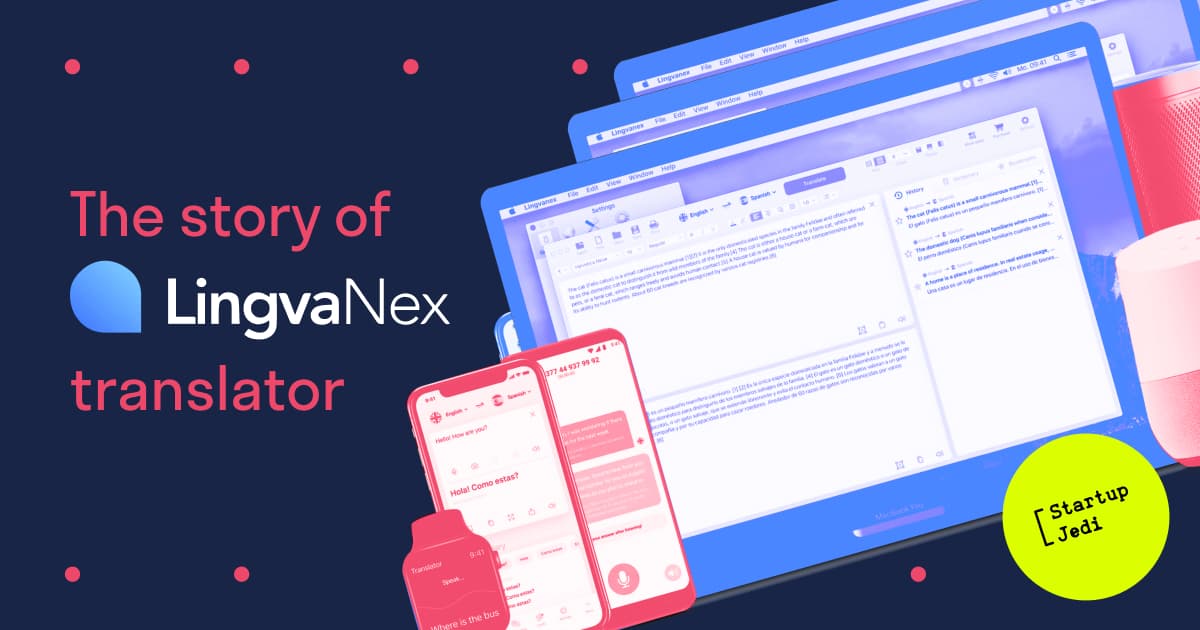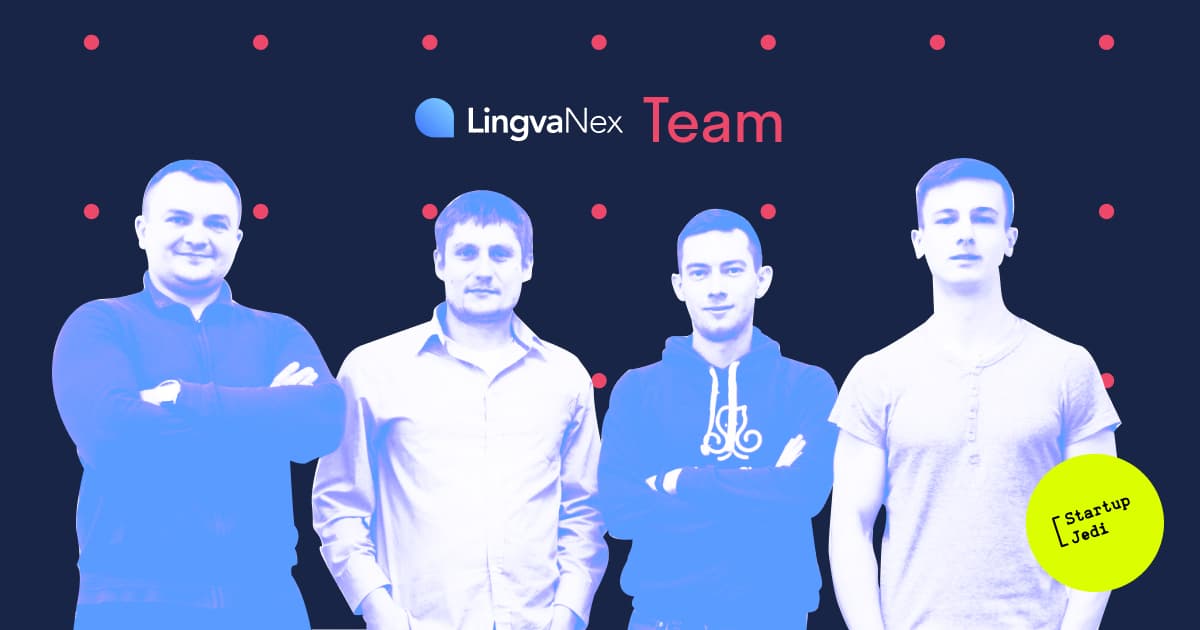
Startup Jedi
We talk to startups and investors, you get the value.
The story about Lingvanex startup could already be set as an example for entrepreneurs-beginners. The team found a successful niche and was able to earn in the process of searching for product launches; they won the competition for users and staff with giants, and made a successful pivot to the B2B market. Now Lingvanex is ready for the next step and invites profile investors and startups wishing to integrate translation functions into their products. Alexey Rudak, CEO of the team, revealed the insights.

Startup Jedi
We talk to startups and investors, you get the value.
Translation-related searches are annually in the top ten in the world. A billion people use translators daily. This is a huge market where you can always find a niche and make money.
At the start of my business, I didn’t plan to create a translator. It was necessary to find a niche where I can succeed without a start capital with the potential for rapid growth. To find it, I made a platform for creating simple iOS applications in minutes: one function, a couple of buttons, a couple of pictures.
In half a year I’ve launched more than 600 applications on this platform: from news readers and task-lists to fitness trainers. I optimized names and descriptions for the most popular search requests and gathered organic traffic. I didn’t use the adverts. In the first year, people downloaded all my applications more than 10 million times.
There were in-app purchases and adverts. Thanks to this, I was able to choose the best ways for purchase conversion, returnability and LTV. With these metrics, the most interesting thing was to develop music services, GPS trackers, translators, fitness applications.
Translators won as the search traffic for them is subdivided into thousaтds of long-tail requests. Usually, people are searching not for a simple “translation” but for a specific language pair: for instance “translation from Arabic to French”. Even the largest competitor wouldn’t be able to buy all the traffic with thousands of requests, so this niche was perfect to start growing.
My apps for testing the demand, started generating revenue of about $30 000 per month. I decided to invest this money in creating quality products in the translation market. I hired an outsourcing company and with them I started developing a more functional translator, which will work on all popular platforms and devices: smartphones, desktops, smart speakers, which used the Google API translation at that time.
Our translator had a more well-thought-out interface and more functionality, and users chose us. We also offered them a real-time translation of telephone conversations, group chats translation, translation of files with preservation of formatting and other functions that aren’t available in Google, MS, Yandex services.
It took us one year of hard work to the moment when the number of installations of our translating software has exceeded ten million. But we couldn’t continue growing under the “hood” of the Google API, since most of the revenue we had to give to the “corporation of goods”.
We had to spend more than $600 000, which we’ve earned on translators in three years, to create our own API for translation. In May 2020, we significantly enhanced the translation quality for European languages, having become better than Microsoft and Amazon, and came close to Google. This has greatly improved the metrics of our products.
Thanks to the working and profitable translation technology we acquired access to the new prospective market.
...

Users are used to free translators. You can just click a button in your browser and get a result that will satisfy most needs — there is nothing to pay for.
The major funds in the machine translation market is in the B2B segment. Far not all corporate tasks are solved by a button click in the browser. We noticed that more than half of our paying clients use apps for their work: small business owners and entrepreneurs translate documents, letters, invoices, advertising texts, phone calls.
Google doesn’t allow you to translate a file with formatting preservation and more than 5 thousand characters at a time, and also, it doesn’t provide an option for offline translation for business tasks where data privacy is important at the first place; but all this is possible in Lingvanex applications.
In addition, when translating with the Google API, you must indicate that the translation was made by Google, and give a link to its website wherever there is a translation (still, many don’t know about this). If you have technical questions about the Google API, you can get an answer only by purchasing an expensive support package, and it is a real quest to figure out how to buy it.
The translating solution from Lingvanex is 4 times cheaper than Google for API: there is no attribution, the support is free and we provide help on integrating the app into your project with the same number of languages and quality as in Google. Besides, we have a feature that can integrate text translation into any business process, like SDK or a server solution, in order to completely secure the company’s data.
With Lingvanex, you can translate text in any application, file, image, or operating system interface by simply highlighting the text area.
The advantages of the Lingvanex solution are translation quality, price, functionality, ease of use, data protection and excellent service.
...

The machine translation market is large but very fragmentized: 200 largest companies take not more than 16% of this market. But they’re actively enlarging their share by buying prospective competitors. That’s why it is more logical to put up the company for sale.
We got into a good niche, approved the demand and product quality. Big American mass media wrote that Lingvanex is more awesome than Google, we have a contract with a large corporate client and a few smaller clients.
But today we are forced to do a very unpleasant thing for any businessman — put clients on a waiting list.
Our products are used very actively. Over the past month, we have reached 2 million translations per day with 400 thousand users — and this is almost the limit of the system capabilities, which now processes clients’ requests for translation.
Our system was created two years ago, when there were much fewer users and they were processed with the Google API. Then there was no point in building a system ready for high loads — after all, these loads could never have happened.
We are now raising funds to get rid of the bottleneck as quickly as possible, hire a strong development team and rewrite the system from scratch for future growth in order to support the load of 1000 translations per second. This will allow it to scale up dramatically and connect large customers who are now on the waiting list.
Our first investor, the owner of a large translation company, who will already participate in the Seed-round by the end of the year, takes care of all the issues related to sales and attraction of B2B clients.
In the near future, we want to raise the Seed-round in the amount of $1 million from 2–3 investors simultaneously, in order to close the issue not only of sales and business, but also to have funds with a margin for finalizing the technical part.
We are looking for investors with expertise in machine learning, natural language processing. Understanding of our market is very important for us.
For us, this is the first round of investment, the rest of the time Lingvanex has been developing at its own expense.
...

Today, it is important for us to get funding in the shortest terms, solve technical issues and start an expansive growth. At the end of November, we are planning a large advertising campaign from our partners, on which we’ve spent some part of the budget.
The cost of entering the machine translation market has dropped by two orders in three years: in 2017, tens of millions had to be spent to achieve good results. Now hundreds of thousands are needed for accomplishing the same task. Thanks to the chip makers and cryptocurrency rush.
Dozens of machine translation startups have entered the market. But they are only at the beginning of the journey, and we ran well along it in three years. We already have a ready-made technology, clients and a strong team.
...
Currently the Lingvanex core-team is ten universal specialists. Half of them are great engineers with enormous experience in software development. When they are programming, the other part of the team deals with the operational tasks. Buе as for now, we have more business tasks and engineers switch to them. We all are ultimate soldiers and we can substitute each other.
At the moment, the project of our level has to have a team five times bigger than ours. We can no longer develop the product at the same pace as the demand is growing, so we will expand immediately after attracting investments.
We have already worked with people, who we will invite to the team. These are high-level engineers who are interested in working on our tasks and who know the specifics of the project. Additionally, I motivate people with an option. They understand how fast we are growing and see the value of our offer — after all, any business operating in the international market needs translation functions in one form or another.
Facebook: facebook.com/StartupJedi/
Telegram: t.me/Startup_Jedi
Twitter: twitter.com/startup_jedi
Comments